Corbyn giving speechpublished at 09:44 GMT 6 December 2019
Jeremy Corbyn has taken to the stage alongside shadow Brexit secretary Keir Starmer.
Boris Johnson and Jeremy Corbyn go head-to-head in a live TV debate
One questioner referred to criticism of both men from former PMs Sir John Major and Tony Blair
Mr Corbyn said a Labour government would negotiate a Brexit deal within three months
Mr Johnson said there was "ample time" to build a free trade partnership with the EU after leaving
The NHS featured too, with Mr Corbyn describing it "at breaking point"
Mr Johnson said charges the NHS was to be part of a US trade deal was "Bermuda Triangle stuff"
In his closing statement, Mr Corbyn said he would be as ambitious as the Labour government who created the NHS
Mr Johnson's closing statement said his Tory government would "get Brexit done"
The UK goes to the polls next Thursday
Victoria King, Emma Harrison, Alex Therrien, Hazel Shearing, Joseph Lee and Gary Rose
Jeremy Corbyn has taken to the stage alongside shadow Brexit secretary Keir Starmer.
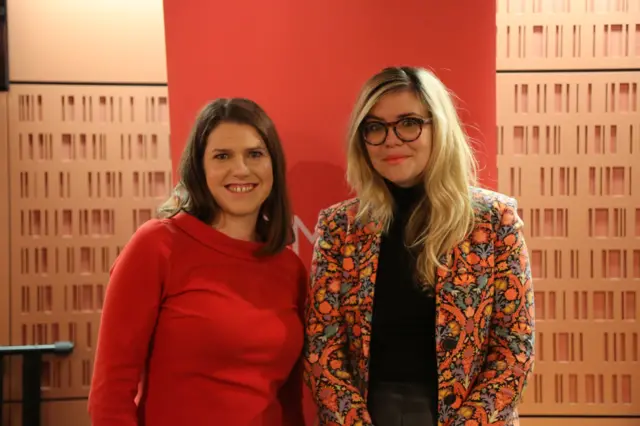
Liberal Democrat leader Jo Swinson will talk to Emma Barnett on BBC Radio 4's Woman's Hour programme at 10:00 GMT.
It is part of a series of interviews with party leaders during the election campaign.
You can listen on the radio or via the link here.
BBC's political editor tweets...
Allow X content?
This article contains content provided by X. We ask for your permission before anything is loaded, as they may be using cookies and other technologies. You may want to read X’s cookie policy, external and privacy policy, external before accepting. To view this content choose ‘accept and continue’.
Allow X content?
This article contains content provided by X. We ask for your permission before anything is loaded, as they may be using cookies and other technologies. You may want to read X’s cookie policy, external and privacy policy, external before accepting. To view this content choose ‘accept and continue’.
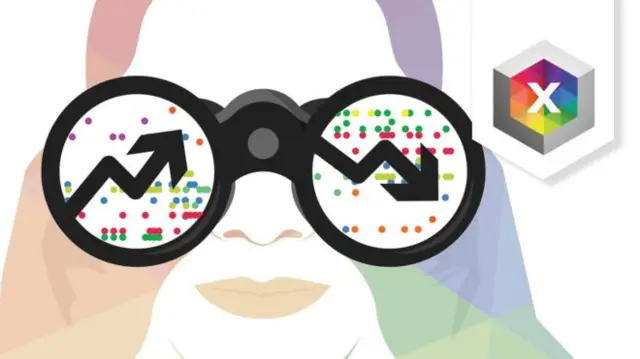
With less than a week to go before the UK goes to the polls, check out the latest opinion poll trends with the BBC's poll tracker, which measures how people say they are going to vote on 12 December.
Robert Cuffe
BBC head of statistics
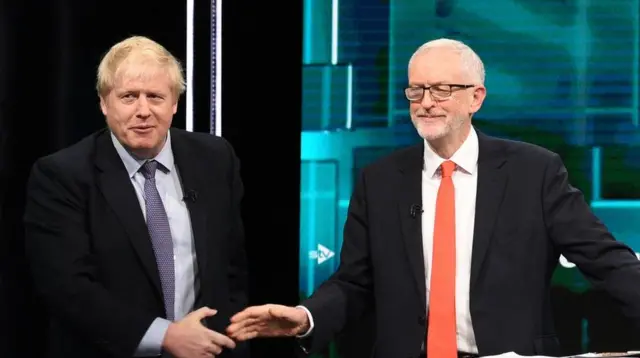 Image source, Getty Images
Image source, Getty ImagesWith any polling, you don’t want to get too obsessed about the exact numbers, it’s the trends that really tell you the story.
For Boris Johnson, his net approval rating is below zero, that’s because slighly more people disapprove of him than approve of him. For Jeremy Corbyn it’s even worse, it’s much lower down.
What’s happened in the approval ratings since the start of the campaign is almost nothing – people haven’t really changed their views about either of the two leaders. It’s looking very, very similar to the start of the campaign.
Looking at how the parties have been doing overall in the polls over the last few months, there has been a sharp rise for both the Conservatives, and Labour – they have been moving up in the polls.
Their progress is almost a mirror image of the Lib Dems and Brexit Party – who have been moving down in the polls.
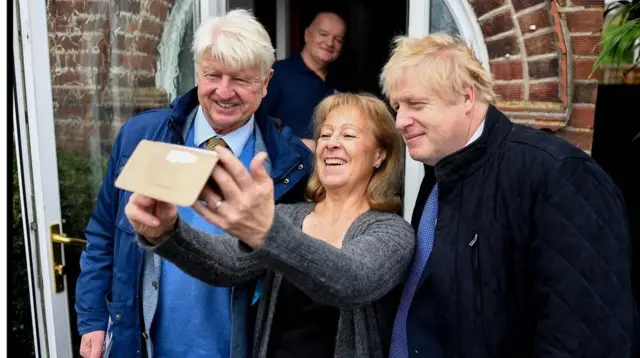 Image source, Andrew Parsons/i-Images
Image source, Andrew Parsons/i-ImagesA battle to unseat the prime minister is raging in a commuter town on the outskirts of London.
Mr Johnson is defending the smallest constituency majority for nearly 100 years, but could he actually face defeat in Uxbridge and South Ruislip?
The BBC's Sam Francis has been taking a look.
The BBC's Jon Kay takes us behind the scenes in the studio in Southampton, where Boris Johnson and Jeremy Corbyn will go head-to-head later.
 Today Programme
Today Programme
BBC Radio 4
Ms Long-Bailey says she has not read the Jewish Labour movement's submission to the Equality and Human Rights Commission (EHRC) about anti-Semitism in Labour, but says the details of it she has read in the press are "absolutely shocking".
She repeats her previous comments that initially, the party did not do enough to tackle anti-Semitism, but says it has sped up processes, including "far more intensive" ways of dealing with problems, and a quicker suspension and expulsion process.
She says the comments she has read about the way some members have been treated are "horrifying" and "if they've been treated that way by members of the Labour party, then people who in the Labour party shouldn't be members of the Labour party."
Labour still has "further to go" on addressing anti-Semitism in the party, she says, adding it is "important" the party listens to comments and reports and "very carefully considers and acts upon any recommendations the EHRC make."
Cabinet minister Michael Gove's appearance on Radio 5 Live earlier has been getting a bit of attention on social media after he gave out the phone number for the No 10 switchboard.
He was asked to give a number on a scale of one to 10 for the likelihood of Boris Johnson doing an interview with Andrew Neil. He replied with the phone number and encouraged the public to call Boris Johnson’s diary secretary to find out.
Allow X content?
This article contains content provided by X. We ask for your permission before anything is loaded, as they may be using cookies and other technologies. You may want to read X’s cookie policy, external and privacy policy, external before accepting. To view this content choose ‘accept and continue’.
 Today Programme
Today Programme
BBC Radio 4
Ms Long-Bailey is challenged over Labour's claim that its plans on inequality could save families an average of £6,700 a year, following criticism it is misleading.
Presenter Mishal Husain points out the Institute of Fiscal Studies (IFS) have said the chances of any family benefiting from the full amount suggested by Labour are "remote".
Ms Long-Bailey is challenged over how many families would receive the full £6,700 saving, but she repeatedly refuses to provide the figures.
She says the party has a "fully costed manifesto" and the £6,700 figure is "an aggregated median right across the whole of society", admitting that not all families would benefit from certain Labour pledges.
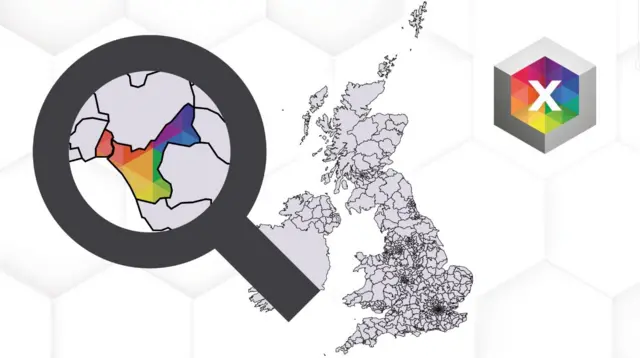
As the main parties continue to try and win you over ahead of polling day, here's a reminder that you can find all the candidates standing on 12 December on the BBC website.
Use our postcode search to find who is standing in your area.
 Iain Watson
Iain Watson
Political correspondent
This evening‘s head-to-head debate on BBC One between the two men who could be PM a week from now could be crucial.
The polls suggest that the Conservatives are still comfortably ahead of Labour so Boris Johnson is the man carrying the fragile vase across a shiny floor – he has to try his utmost not to slip up.
Jeremy Corbyn has one more prime-time opportunity to convince wavering voters he is fit to hold the keys to No 10.
Both men are likely to return to their core messages – Mr Johnson on Brexit, and Mr Corbyn on investing in public services and protecting the NHS.
But the Labour leader was handed a potential weapon in the unlikely form of the BBC inquisitor Andrew Neil.
Last night, Mr Neil challenged the PM to participate in an interview on the theme of trust. While he has appeared on other BBC programmes, so far Mr Johnson has declined the invitation.
Labour insiders are hopeful this can inflict more damage on the PM than they themselves have managed thus far
So it will be tempting for Mr Corbyn to focus as much on the personality of his opponent, as on his own policies, in tonight’s debate.
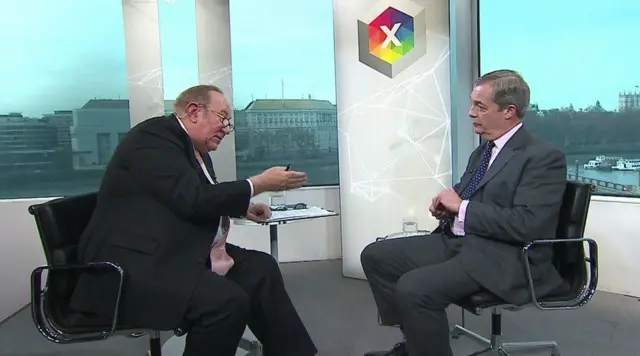
After Brexit Party leader Nigel Farage became the fourth party leader to be interviewed by the BBC's Andrew Neil in this election campaign, our BBC Reality Check team looked at some of his claims. Here is one:
Claim: Immigration has put a "massive burden" on the NHS
Reality Check: The Migration Advisory Committee, an independent public body that advises the government, looked at this as part of its report into the effects of immigration from the European Economic Area (EEA).
It found that migrants from Europe "contribute much more to the health service and the provision of social care in financial resources and through work than they consume in services".
It said migrants from the EEA tend to be younger and healthier than the UK-born population, and consume fewer NHS services than them.
It found "no evidence that migration has reduced the quality of healthcare".
According to the Health Foundation,, external13.3% of the entire workforce of NHS staff in England, and 28.4% of doctors, are from outside the UK (both EU and non-EU).
Read more of Reality Check's analysis here.
 Today Programme
Today Programme
BBC Radio 4
Labour's Rebecca Long-Bailey defends the party against criticism that it would raise costs for businesses if elected on 12 December.
The Shadow Business Secretary tells BBC Radio 4's Today programme Labour's plans for a business development agency will address the "patchy" landscape for businesses and provide "one-stop shop" for entrepreneurs to go to for advice and support.
When asked about criticism that businesses would have increased costs under Labour, Ms Long-Bailey says the party will also unveil a 20 point reform plan - which includes making the apprenticeship levy "far more flexible" - to help businesses.
She defends the party's proposed increase in corporation tax of 21% for small businesses and 26% for larger businesses, as "pretty moderate" when compared to "other industrial economies."

As the big build up to tonight's election debate between Jeremy Corbyn and Boris Johnson continues, BBC Breakfast presenter Jon Kay has revealed the results of a coin toss.
He says: "Mr Corbyn will stand on the left for tonight’s TV debate. Boris Johnson on the right. Maybe no surprises there."
 Today Programme
Today Programme
BBC Radio 4
Here's a little more from Michael Gove's earlier interview, where he was asked about Labour’s position that EU citizens should have a vote in another Brexit referendum because they would be directly affected by the result.
Mr Gove says he understands the argument but adds that it is "fundamentally an assault on the basic democratic principle”.
He says Labour are trying to rig a potential second EU referendum “because a majority of people in the parliamentary Labour Party were in favour of Remain”.
“In this new referendum we would have two options which are essentially Remain and Remain-light,” he adds.
He says it isn’t clear whether Labour’s proposed Brexit position would allow the UK to take full advantage of leaving the EU since it favoured staying in a customs union.
What is Labour's Brexit plan? We have the details here.
 Nick Robinson
Nick Robinson
Presenter, The Prime Ministerial Debate
There is nothing to match the drama, the unpredictability and the choice-defining clarity of watching the two leaders who want to occupy No 10 in a week's time, going head-to-head in a live debate.
While the world of social media allows news outlets and politicians to reach the general public, over the years we have witnessed a changing balance between the perceived risks and opportunities.
The leaders will have prepared vigorously. Every answer, pause, and raising of the eyebrow will be scrutinised in real time.
Political strategists, who were once worried about how their candidate would appear to the millions watching live are now also concerned that a clip, only a matter of seconds long, edited in a disingenuous way could be watched by more people than the original broadcast.
With less than a week to the polls, as audience interest is at its peak, this debate will give people who don't usually engage with politics the chance to watch as our next prime minister faces questions from our live audience and the general public.
 Today Programme
Today Programme
BBC Radio 4
Cabinet minister Michael Gove has moved across from 5 Live to Radio 4’s Today programme, where he is asked about the Conservatives accusing Labour of trying to fiddle any new referendum by allowing EU nationals the right to vote in it.
He says EU nationals have never been allowed to voted in general elections or a referendum in the UK, saying “we just think it would be unfair”.
He compares it to starting to play a rugby league final – where there are 13 players on either side - and then one team deciding to switch to rugby union and bringing two extra players onto the field, saying “that simply wouldn’t be fair”.
The Tories are claiming that Labour’s plans would give two million EU nationals the vote in another referendum – a figure which our BBC reality check team says relies on a lot of assumptions.
Plenty of promises have been made by politicians in the election campaign - but what big issues have they been quiet about? From rising sea levels to lower house prices to the UK's role in the world, BBC correspondents look at some of the lesser-mentioned issues.
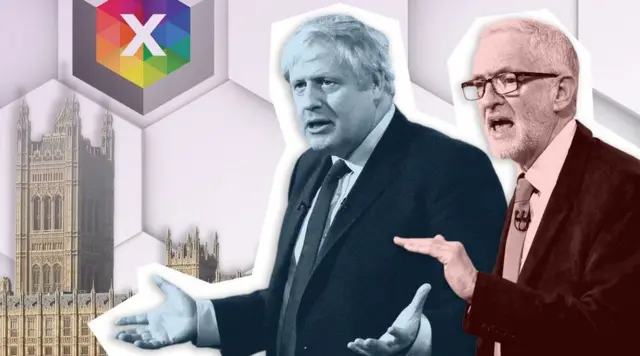
Here's all you need to know about the live head-to-head debate between Boris Johnson and Jeremy Corbyn.